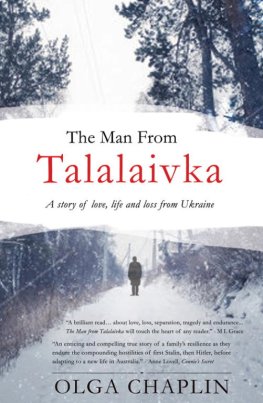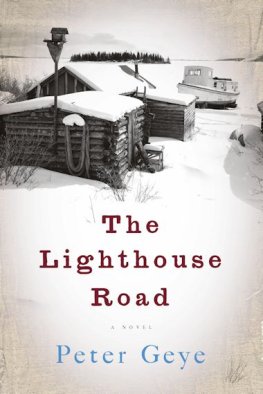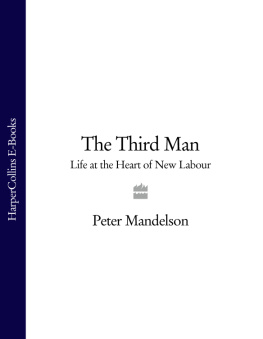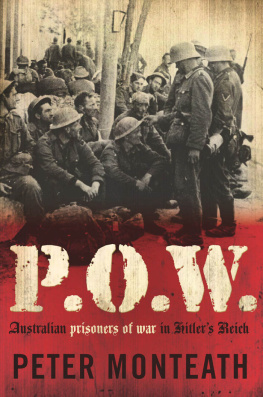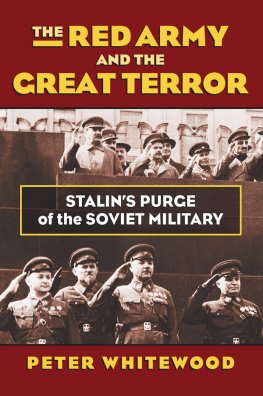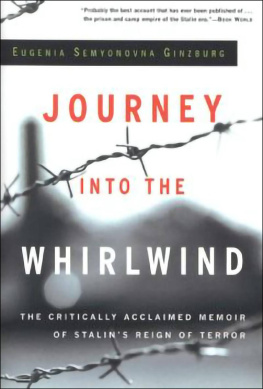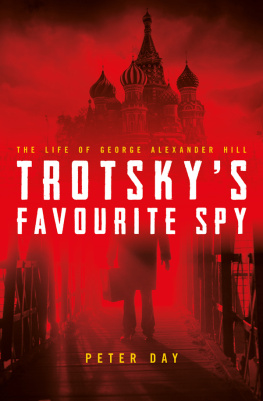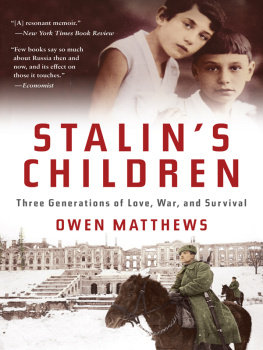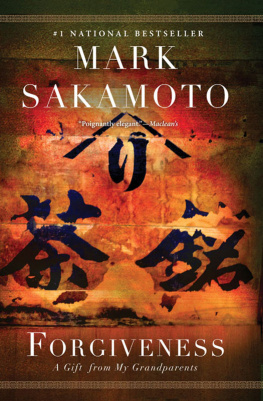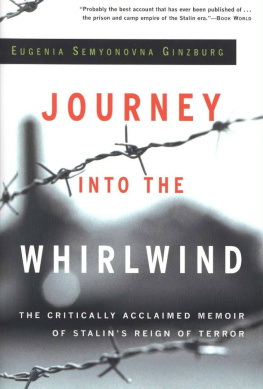Olga Chaplin
THE MAN FROM TALALAIVKA
A story of love, life and loss from Ukraine
Ditte moyi ditte, ditte moyi kvitte
Children my children, children my flowers
Taras Shevchenko
Occasionally throughout this work of historical fiction, I have taken the liberty to present key words and phrases in a personalised version of Ukrainian, as there were regional dialectical differences during the era. I have tried, as authentically as possible, to capture the language my parents used while at the same time acknowledging that my translations may not be entirely accurate and hope the reader will forgive me any errors.

Chapter 1
December 1929
A massive poster caught Peters eye as he entered. He paused, surprised. Lenins simple but inspiring portrait was gone. In its place, Stalins pseudo-benevolent face stared back at him, raised arm pointing the way forward to this, his first Five Year Plan. Peter looked about him and shook his head; sensed that though it seemed but a small change, it was significant.
Talalaivkas central office was bristling with electrifying tension. Comrade Stalins protg, Kaganovich, had just made his personal appearance, leaving extraordinary orders from the Secretary General. They would need extra forces from their military police and army units in order for this final radicalisation of agriculture to succeed at this breakneck speed. The consequences, the soviet officials knew, would be horrific. Already hardened since Stalins rise to power, and tense with anticipation, they braced themselves for the onslaught of human misery that the implementation of these extreme orders would cause.
The tension stung Peters face more than the biting air as he strode through the great door. He hurriedly took off his heavy cap, brushed its snow against his long army coat. He was anxious to return home, to sanity, to Hanya and his infant sons. He headed towards the back office to speak to Constantin, his senior veterinary colleague. His work papers were yet to be completed, then signed by soviet officials, before he could take his leave. Already he was several days late returning from his circuit of veterinary duties. And the winter snows had not yet set in.
He looked again at the poster and shook his head thoughtfully. At that moment a senior official, observing him, tapped his shoulder in recognition.
Drastysa, Petro Yosepovich! Peter returned the obligatory soldiers salute. These days, it was difficult to separate the civilian from the military, or from the police. He knew he was walking a fine line of tolerance from the extremists among them.
Ah, Petro, Constantin smiled, his face lighting up. Im glad youve returned safely. Such heavy snows. He grasped Peters shoulder reassuringly and glanced to the outside office, with its prickling atmosphere. And so dangerous now. He stopped, as a soviet official passed. Peter nodded. He could not comment. His ailing colleague had little to lose now, whereas he had his young family to consider. His fingers itched to complete his quota forms, his heart impatient to return to Hanya and their little sons. Vanya would delight in the few sweets he had wrapped, and even in these several weeks baby Mischa must have grown from his tiny proportions. This years Saint Nikolass feast day will be especially poignant, he promised himself, in spite of the political difficulties and economic hardships.
His horse, ploughing soft snow almost effortlessly as they headed homeward, seemed to sense his urgency. Peters spirits lifted. He felt revitalised in the freshness around him. Virgin snowflakes, carried by swirls of light morning breeze, danced about him like miniature white doves freed in flight. Each kilometre distanced him from the hotbed of political turmoil and conspiracy that had overtaken the Talalaivka bureau recently. He turned his back, temporarily, on the chaos the triumvirate had brought, with General Secretary Stalin at its helm.
In these few short years, since completing his army service and training, Peter saw changes within his Ukraine that could only be explained in the light of Lenins untimely death, and the ensuing power struggle between members of the Bolshevik Partys Politburo. Whatever ephemeral unity the Party apparatchiks published in Pravda, Peter and his trusted friends knew differently. Now, with Lenins new economic policies abandoned, ostensibly for the purity of Bolshevik ideals, and Stalins power supreme with the implementation of this first Five Year Plan, all certainty was gone. No-one in this part of the countryside, in Sumskaya Oblast, knew from where their daily bread would come, nor under which roof they would be protected. And already, the gulag labour camps were swelling at an alarming pace. Such was the legacy of Stalin and his henchmens application of the so-called purist Bolshevik ideals.
He reined his horse at the southern crossroads of Talalaivka, and headed south-eastward towards Kylapchin and his familys farm. He paused, allowing a unit of soviet militia, led by trained soldiers, to pass. The captain eyed Peter, recognised him in his heavy army coat, and tipped his cap in soldierly fashion. Peter responded. He had trained with this man who, like him, was energetic, keen to do well. Peter had chosen the civil service once his official national training was completed; the captain had remained in the army. A good leader, Peter noted thoughtfully as the unit passed, but for whom, now that our circumstances are changing so rapidly?
He cupped his hand over his eyes, protecting them from the sheen of the snow. Still so many kilometres to make good, but a perfect day nonetheless. The anticipation of being with Hanya and the infants spurred him on. He smiled as he thought of these irreplaceable jewels that filled his heart. Sweethearts, and so young, it seemed, he and Hanya had married immediately upon his discharge from the army; had planned and built their tiny xatka on his fathers lands at a little distance from the familys farmhouse and had seen the birth, first of Vanya, several years ago and now of their baby, Mischa.
If ever there was a time of bittersweet contemplation, Peter felt it was now. The sweetness of his idyllic marriage, and his healthy infants. The bitterness of the fast-changing political and social events, and the consequent economic difficulties already ravaging the countryside. He instinctively reached down to check the sacks of food scraps fastened carefully to the saddle: like an expert scavenger, he had picked out still-fresh cabbage and beetroot, even black rye bread, carelessly discarded by the Talalaivka officials, whose daily supplies were purloined from the local area. Such good fortune for my family, he reflected, we may not need to struggle. But what of the others, who dont find enough food?
At last, his xatkas chimney smoke welcomed him. He reined his horse under the cover of the sloping roof and sprinted the last paces, threw open the door, the sweet smell of his home surprising his nostrils anew. He hugged his Hanya and touched her soft pale face, her silky dark hair, and felt the closeness of Vanya in his arms. Baby Mischa looked strong, content, and indeed had grown. Peter breathed relief. He knew he would need to hide this additional food; he determined to reinforce their secret cellar to keep it safe through the winter. But for now life was as good, as complete, as any honourable Ukrainian man could wish for. Give us strength, he prayed silently to his magnanimous Maker, that we wont be hounded into kolkhozes that we wont be starved out of our own farmhouses. He looked forward to the feast of Saint Nikolass celebrations. Hanya and little Vanya had already chosen their small fir tree, and were collecting acorns and fir cones for its decoration; the few kukurhyske, baked and carefully hidden, to be brought out on the eve of the festivities.

